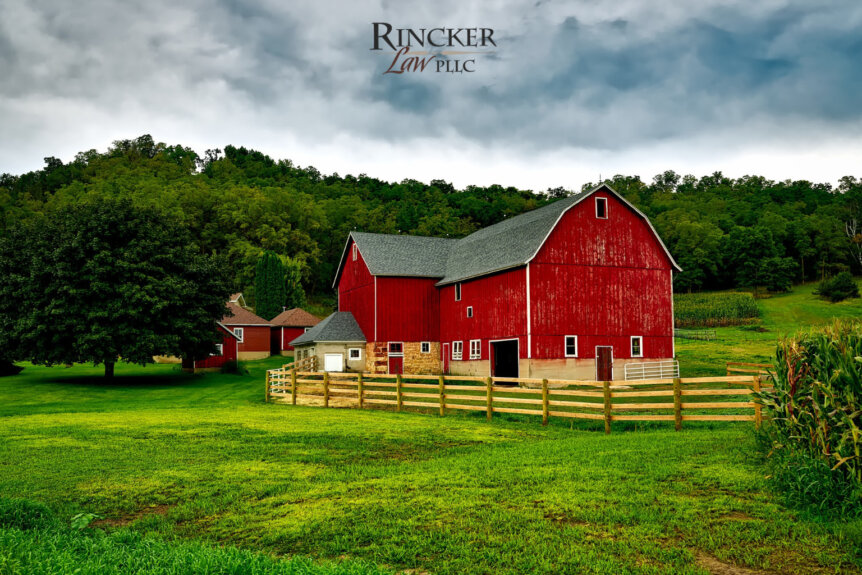When it comes to divorce, one of the most complex issues for farm families is the division of farmland in an Illinois divorce. Unlike dividing up a bank account or household items, farmland often represents not just property but also a source of income, a family legacy, and a livelihood. In this blog, we share how Illinois courts typically handle farmland during divorce, the factors that determine whether it’s marital or non-marital property, and strategies to help protect your interests.
How Is Farmland Classified in an Illinois Divorce?
Illinois is an equitable distribution state, which means that marital property is divided fairly (not necessarily 50/50). One of the first questions in dividing farmland is whether the land is considered marital property or non-marital property.
- Non-marital property: Farmland acquired before the marriage, through inheritance, or as a gift may remain with the original owner.
- Marital property: If farmland was purchased during the marriage or maintained with marital funds, it is likely to be considered marital property—even if only one spouse’s name is on the deed.
Things can get complicated if non-marital farmland appreciates in value during the marriage, especially if both spouses contributed labor, funds, or improvements to the land. In those cases, a spouse may claim a right to part of the increased value.
What Factors Do Courts Consider in Dividing Farmland?
Courts in Illinois evaluate many factors when dividing farmland in divorce, including:
- Length of the marriage and each spouse’s contributions.
- Financial and non-financial contributions, such as farm labor, bookkeeping, or homemaking.
- Custody arrangements and whether the farmland contributes to the children’s stability.
- Future earning capacity of each spouse.
- Economic circumstances at the time of divorce, including the liquidity of the farmland and whether selling it would cause hardship.
Judges strive to divide property in a way that is fair and practical, but farmland’s unique nature often makes a straightforward division impossible.
Can the Court Force the Sale of Farmland in Divorce?
Yes, although courts prefer alternatives, a judge can order the sale of farmland if dividing the property equitably requires it. For example, if there are no sufficient liquid assets to offset farmland awarded to one spouse, selling the land may be the only way to achieve fairness.
However, courts often consider the farm’s importance to family heritage and business continuity. Spouses may negotiate to buy out the other’s interest or to restructure ownership to avoid forcing a sale.
How Do Buyouts Work in Farm Divorces?
If one spouse wishes to keep the farm intact, a buyout may be negotiated. This typically involves:
- Valuation of the farmland by a qualified appraiser who understands agricultural property.
- Negotiation of terms, such as installment payments, refinancing, or trading other marital assets in exchange for farmland ownership.
- Securing financing, often through agricultural lenders or farm credit services.
A buyout allows the farm to remain operational while providing the other spouse with fair compensation.
How Is Farm Equipment and Livestock Divided?
Farmland is only one piece of the puzzle. Farm equipment, livestock, and crop inventory are also marital assets that must be divided. Valuation can be tricky because these assets depreciate quickly or fluctuate in value. It is common to use agricultural accountants or appraisers to ensure accurate valuations.
What Role Does a Prenuptial or Postnuptial Agreement Play?
A prenuptial agreement or postnuptial agreement can be a powerful tool to protect farmland in case of divorce. These agreements allow spouses to pre-determine how farmland and farm assets will be divided, reducing uncertainty and costly litigation. Without such agreements, farmland may be subject to equitable distribution rules.
Can Mediation Help in Dividing Farmland?
Yes. Mediation is often beneficial in farm divorces because it allows spouses to work together to reach creative solutions, such as partial buyouts, staggered payments, or joint ownership structures that may not be available through litigation. Mediation also helps preserve family relationships, which can be important if children or extended family remain involved in farm operations.
FAQs About Division of Farmland in Illinois Divorce
- Is farmland always divided equally in Illinois divorce cases?
No. Illinois law requires equitable—not equal—distribution. Courts aim for fairness based on the circumstances. - What if the farmland was inherited?
Inherited farmland is generally considered non-marital property, but if marital funds or labor significantly increased its value, the other spouse may claim a share of the appreciation. - Can farm businesses be split in a divorce?
Yes. Farm corporations, LLCs, or partnerships can be divided or restructured, and shares may be awarded to one or both spouses depending on the circumstances. - How can I protect my family farm before marriage?
A prenuptial agreement is the most effective way to protect farmland from division in divorce. - Do I need a lawyer who understands agriculture?
Absolutely. Dividing farmland requires unique knowledge of agricultural law, property valuation, and financing options.
Need Assistance With Division of Farmland in an IL Divorce?
The division of farmland in an Illinois divorce is one of the most complex issues farm families face. Farmland isn’t just real estate—it’s a source of income, a legacy, and often tied to generations of hard work. Protecting your rights requires careful planning, valuation, and advocacy.
If you are facing divorce and farmland is involved, don’t navigate it alone. Call Rincker Law PLLC today at (217) 774-1373 to speak with an experienced agricultural and family law attorney who can help protect your land and your future.

